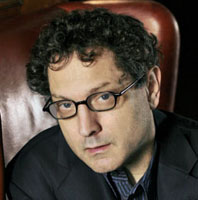Alumnus Spotlight: Fred Kaplan

photo: Will O'Leary
Degree: PhD in Political Science, 1983
Dissertation: The Men Who Thought the Unthinkable: Strategy and Strategists in the Nuclear Age
Current Position: National Security columnist for Slate. He also writes articles for several other magazines, including the New York Times, the Washington Post, and The Atlantic.
Recent Publications:
Daydream Believers: How a Few Grand Ideas Wrecked American Power (Wiley, January 2008)
1. Your 1983 book, The Wizards of Armageddon, unveiled the story of the men behind the U.S. nuclear strategy during the Cold War. Is your new book, Daydream Believers, a sequel, a sort of "wizards of GWOT?"
Fred Kaplan: I hadn't thought of it in those terms, but I guess it is, in the sense that both books deal with the interplay among policy, politics, and ideas. Wizards dealt with the men (and they were almost entirely men) who invented nuclear strategy and helped translate it into policy; Daydream deals with the people—including a couple of the same men—who came up with military transformation, regime change, missile defense, and the freedom agenda. In both books, the ideas may have started out as reasonable responses to changes in the world but soon morphed into dangerous abstractions.
2. As a former journalist with the Boston Globe and, for the past five years, as a columnist for the on-line magazine Slate, you have written on foreign and security affairs for well over two decades. Have you perceived changes over that time in the U.S. media coverage of war and military affairs?
Fred Kaplan: Yes. In the ‘80s, which was during the Cold War but still (relatively) a peacetime decade, the focus of journalists was mainly on a handful of big-ticket weapons systems, mainly nuclear bombers or missiles, and budgets. Now that we're in a couple of wars, the focus is all on operations and almost not at all on weapons and budgets. In both eras, the press follows the focus of the Pentagon or Congress. It's hard to step out as a lone crusader. Still, I am surprised. Not counting the wars in Iraq and Afghanistan, the US is spending about a half-trillion dollars a year on the military—nearly an all-time high in real terms and about as much as all the other countries in the world combined—yet what we're buying gets almost no attention.
3. What can you tell us about the relative merits or constraints of publishing on-line versus in a printed newspaper or magazine?
Fred Kaplan: Online has great advantages. If I'm writing about a document or a hearing, I can hyperlink to the text or transcript. Readers can look at it themselves. If I make a mistake, I can correct it in the article instead of in a “corrections” box that few people read. The whole process is accelerated. Often, I come up with an idea at 10, write the column by 4, people are reading it by 5. Of course, if I write something for, say, the NewYork Times, more people read the piece (though Slate has a very sizable readership). And if I write for a magazine, I get a lot more space.
4. You started your career as an aide to Congressman Les Aspin. How well did your studies and research in the Defense and Arms Control Studies (DACS) program prepare you for your work on Capitol Hill? for your career as a journalist?
Fred Kaplan: I owe my career to DACS. I could not have done what I've done if I'd gone to just about any other graduate school. I'm not saying that just to be nice. When I worked for Aspin (1978-80), he was famous for doing these quantitative analyses of weapons and policy and strategy; and that's what I learned how to do at MIT. As a journalist, this training gave me a lot of credibility. I could inject analysis into my journalism with a certain authority, and my sources knew that I knew how they thought; they didn't have to start at Step One with me. The security-studies department was quite a bit different when I went there, from 1976-78. It was entirely analytical; we learned how to do the calculations of nuclear deterrence, force requirements, that sort of thing. It offered very little in the way of history or political analysis. I learned that elsewhere.
5. Would you recommend a career in journalism to other DACS and SSP alumni or current SSP students?
Fred Kaplan: The market is very different from when I got into this. I was asked to write for the Boston Globe in 1982, when a lot of newspapers were hiring “experts” to write about defense policy (Michael Gordon came to the Times from National Journal, Jeffrey Smith came to the Post from Science , if I recall correctly). I think there's still a demand, given the world today, for journalists who have a background in military matters. In some ways, newspapers have become a bit more of a closed game; but in other ways, journalism is wide open—what with blogs, online magazines, even online features of mainstream papers. It's not as secure a job as it was 20 years ago, but then again nothing is.

